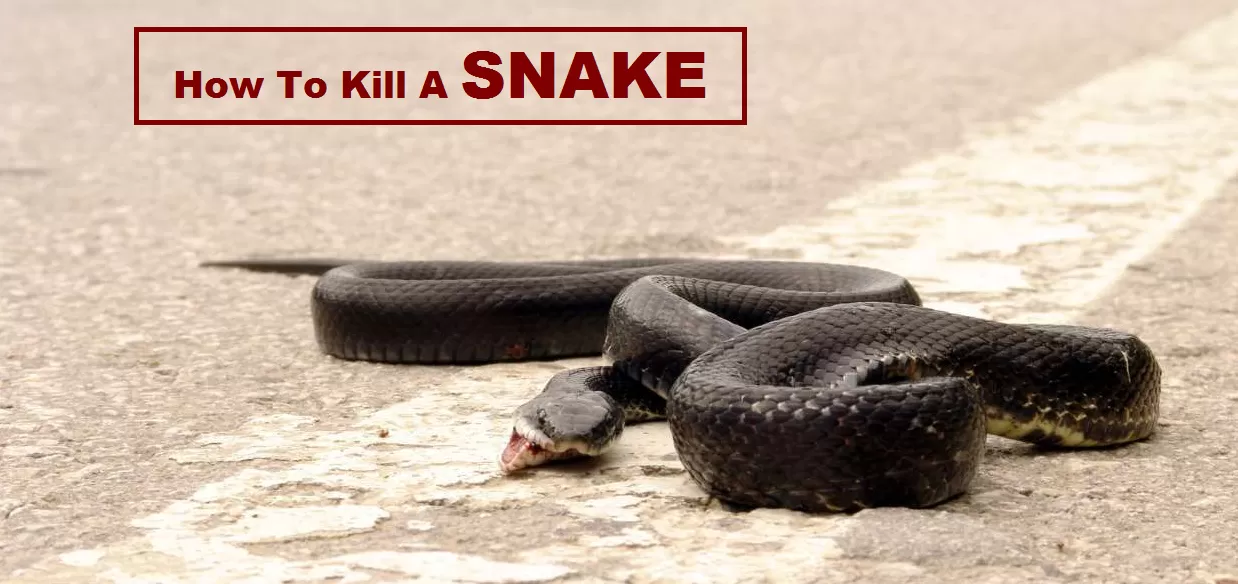How To Kill A Snake
While snakes are important ecosystem members, they can harm humans and pets. Venomous snakes, in particular, can be deadly and should be avoided at all costs. If you encounter a venomous snake on your property or home, it is important to protect yourself and your family immediately.
One reason why people may need to kill a snake is if it poses an immediate threat. It could be if the snake is venomous or acts aggressively towards humans or pets. In this case, it may be necessary to use lethal means such as a shovel or firearm to eliminate the danger.
Another reason killing a snake may be necessary is if it has taken up residence in an area where humans frequent it. For example, if a snake has made its way into your home or garden shed and cannot safely be removed, then killing it may be the only option.
It’s worth noting that many non-lethal ways to deal with snakes don’t involve killing them. For example, you can use humane traps to catch and release snakes back into the wild. However, in some cases where safety concerns arise or where relocation options are not available, killing the snake may be unavoidable.
Snake repellent
If you’re looking for ways to eliminate snakes, using a snake repellent may be your best bet. Several types of snake repellents are available in the market, including chemical and natural options. Chemical snake repellents usually contain naphthalene or sulphur as their active ingredients, while natural ones use plant oils such as cinnamon or clove.
To use a snake repellent effectively, you must identify the areas where snakes are most likely to hide or travel through. Then, apply the product according to its instructions. Remember that some products may require frequent reapplication to maintain effectiveness.
While using a snake repellent is an option, it’s important to note that killing snakes is not always necessary or legal. Snakes are often important in maintaining the ecosystem and can help control rodent populations. If you find a snake on your property and want it removed, consider contacting a professional wildlife removal service instead of attempting to handle it yourself.
snake traps
One of the most effective ways to eliminate snakes is using snake traps. There are different types of traps that you can use, including glue-based traps and live traps. The type of trap you choose depends on your preference and the specific situation.
Glue-based snake traps work by sticking the snake to a sticky surface, preventing it from escaping. These traps are easy to set up and relatively cheap compared to other traps. However, they may not be humane since they can cause severe pain and suffering for the trapped snake.
Live traps, on the other hand, work by capturing snakes without harming them. These traps are ideal if you do not want to harm or kill the snakes but want to remove them from your property. Live trapping requires patience and skill since snakes are known for their agility and speed. Once you have captured a snake in a live trap, you should release it safely away from human habitation.
What is the best way to kill a snake?
When it comes to killing a snake, there are several methods you can use. The most popular and effective method is using a long-handled shovel or hoe to sever the head of the snake from its body. It should be done in one swift motion to avoid any unnecessary suffering on the part of the snake. Alternatively, you can use a firearm if you have experience using one and know how to handle it safely.
Another option is using pesticides or bleach to kill the snake. However, this method is not recommended as it can harm other animals and even humans if not used correctly. It’s also important to note that some species of snakes are protected by law, so before taking any action, make sure you’re aware of your local laws and regulations.
In conclusion, snake killing should only be made when necessary for safety. Always prioritize your safety and seek professional help if needed. If you choose to kill a snake yourself, do so humanely and responsibly while following all relevant laws and regulations in your area.
How can I prevent snakes from coming into my yard?
While killing snakes may seem like a quick fix, it’s important to remember that snakes play an important role in the ecosystem and should not be killed unnecessarily. Instead, you can take several preventative measures to keep them out of your yard.
One effective way to deter snakes is by removing potential hiding spots. Keep your lawn mowed and remove any piles of debris or clutter around your property. Additionally, try filling any cracks or holes in your home’s foundation or walls that could serve as entry points for snakes.
Another preventative measure is using natural snake repellents such as essential oils like cinnamon, clove, and eucalyptus. These scents irritate snakes’ senses and discourage them from entering the area.
In summary, preventing snakes from coming into your yard doesn’t have to involve killing them. You can safely keep these creatures at bay by eliminating their hiding spots and using natural deterrents while preserving their place in the ecosystem.
FAQs
How do I identify a venomous snake?
Venomous snakes have certain physical characteristics that are easy to identify. Most have slit-like pupils, triangular-shaped heads, and heat-sensing pits between their eyes and nostrils. They also tend to have shorter tails than non-venomous snakes.
What should I do if I encounter a snake?
The best thing to do is to slowly back away from the snake without making any sudden movements. If you’re too close for comfort, use a long stick or other objects to nudge it away from you gently. Please do not attempt to pick it up or handle it in any way.
How can I prevent snakes from coming onto my property?
You can do several things to make your property less attractive to snakes. Keep your grass cut short and remove any piles of debris, such as leaves or logs. Seal any cracks or crevices in your home’s foundation, and close doors and windows tightly when possible. Additionally, consider installing snake fencing around the perimeter of your property as an extra precautionary measure.










